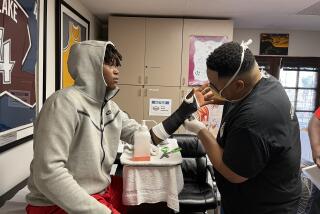A FRESH START
- Share via
CAMARILLO — Nobody knows the rules like Pete Rogalsky.
Backward and forward, from the obvious to the obscure, every rule in high school and college football is Rogalsky’s specialty, has been seemingly since leather helmets were legal.
As assistant instructional chairman for the CIF, the 62-year-old veteran referee teaches new officials, tests experienced officials and is the last word on rules interpretation.
So what joyous irony for Rogalsky that in March 1997, he became an exception to the rule, beating incredible odds to send inoperable brain cancer into remission.
After missing the 1996 football season while undergoing aggressive chemotherapy and radiation treatments, he donned his white referee cap last year and again is officiating high school games in Ventura County on Friday nights and college games throughout the Southland on Saturdays.
He admits to losing a step since his illness, but Rogalsky is running full tilt in another respect: He is a candidate for the Ventura County Board of Education in Tuesday’s election.
“People need to realize that cancer is no longer a death sentence,” he said. “Lots of people get by the disease, survive it.”
From a vantage point a few yards behind center, Rogalsky has witnessed quarterbacks scramble out of danger and gain yardage through sheer determination. But he no longer calls those plays miracles.
He experienced something a lot closer to the definition. His friends say so, too.
“It is a miracle,” said Mike Green, a longtime officiating colleague of Rogalsky. “Based on what most of us conceive when we hear of inoperable brain cancer, you don’t think recovery is possible, much less returning to something as demanding as officiating.”
Among the striped shirt set, Rogalsky’s reputation is unsurpassed. In addition to working a full schedule of games, he enjoys bringing along young officials.
“I remember when I started out, I was missing a test and Pete came to my apartment and had me take it right at my kitchen table,” said Kevin Lukes, an official who lives in Thousand Oaks. “He goes out of his way to help. He has a big heart.”
Said John Pemberton, the CIF instructional chairman and a Pacific 10 Conference official: “Pete is a quiet guy who gains respect from coaches and officials by his actions. He never demands anything, he just earns it.”
A lifelong educator in the Simi Valley and Oxnard Rio school districts, Rogalsky retired as superintendent of the Rio district in 1995, anticipating he would enjoy some free time and whistle while he worked weekends.
He built a workshop beside the large garden of vegetables and fruit trees in the spacious backyard of his Santa Rosa Valley home, where he and Virginia, his wife of 40 years, loved to spend their days.
Their three children are grown and visits with their three grandchildren were a delight.
Rogalsky helped launch a consulting business to assist school districts in applying for government grants; Virginia worked as a librarian at Moorpark College and for the city of Thousand Oaks.
Life was full, yet comfortable. Until the July day in 1996 when Rogalsky blacked out in the garden.
Tests on his heart didn’t detect a problem and a doctor at an urgent care center told him he probably had a virus. The next day he couldn’t get out of bed.
This time, an emergency room doctor told him he had an inner ear infection. Another physician ran an MRI and said he’d probably suffered a slight stroke.
“It didn’t add up and we asserted ourselves,” Rogalsky said.
A second MRI taken in September revealed brain tumors. Virginia phoned the children and Pete broke the news at the next officials’ meeting.
For a man whose stoic nature was an asset as a school administrator and a referee, the frustration of not knowing what caused his symptoms turned into something else when the diagnosis was made.
“At first I thought, ‘Oh, criminy,’ ” he said. “I was angry that the disease got to me. I was angry at cancer. My balance was so poor, I did well to stand up.
“I felt so much support from the [officials’] association. It was difficult to tell them, but I just had to do it, plain and simple.”
Said Les Barut, president of the Channel Coast Officials Assn.: “He was down before he really discovered what it was. But once it was diagnosed, he attacked it. Rather than giving up, he fought.”
Ten weeks of chemotherapy were followed by two radiation sessions a day for three weeks. Officiating was out of the question.
Rogalsky, who had long been a volunteer with the American Cancer Society, joined a wellness group and attended weekly meetings in Camarillo.
“The worst was around Christmas,” Rogalsky said. “My goal was just to get through radiation. I didn’t think about football. I had doubts I’d ever officiate again.”
He agreed to become part of a clinical study for aggressive radiation through his health care provider, which paid for a Los Angeles apartment for he and Virginia during treatment.
Although he nearly was too old to participate in the study, doctors said his superior physical condition made him a good candidate.
In March 1997, it was time for another MRI. His physician, Dr. Michael Tome, called him in to discuss the results.
“We consider your cancer in remission,” Tome said. “Your tumors are gone.”
Rogalsky felt like he’d won the lottery. Now he had more news for his family and friends, news he was elated to share.
His first game back as an official was a season-opener at Royal High. A celebration preceded the game because it was the first in Royal’s new stadium. But nobody felt more joy than the bespectacled, unassuming man wearing a white hat and a whistle.
Rogalsky ended the season working a Southern Section championship game between Bell Gardens and Hacienda Heights Wilson. Lukes said he felt honored being part of the crew.
“After seeing Pete’s condition a year earlier, just watching him flip the coin was amazing enough for me,” Lukes said. “I was heartbroken thinking he wouldn’t be around, much less working football. It is remarkable what the man has done.”
Rogalsky plans to officiate for two or three more years. If he wins a seat on the school board, he will have a four-year term.
Life holds hope again. The Rogalskys hosted a party a couple weeks ago, in part to celebrate their 40th wedding anniversary, in part to celebrate a future of health and happiness.
“It didn’t say so on the invitation, but it was a ‘Thank God I’m alive party,’ ” Lukes said.
Pemberton, the CIF instructional chairman, retained Rogalsky as his assistant throughout the illness.
“I never considered the fact that Pete wouldn’t be here anymore,” he said. “We just went on.
“In officiating, whenever you get an assignment, you look at the list of officials working the game with you. Sometimes the tendency is to say, ‘We might be in a little trouble in this game.’
“But whenever Pete’s name pops up, you’re elated because he’s a top guy. And these days I think you’re doubly elated simply because his name is there at all.”
More to Read
Get our high school sports newsletter
Prep Rally is devoted to the SoCal high school sports experience, bringing you scores, stories and a behind-the-scenes look at what makes prep sports so popular.
You may occasionally receive promotional content from the Los Angeles Times.







